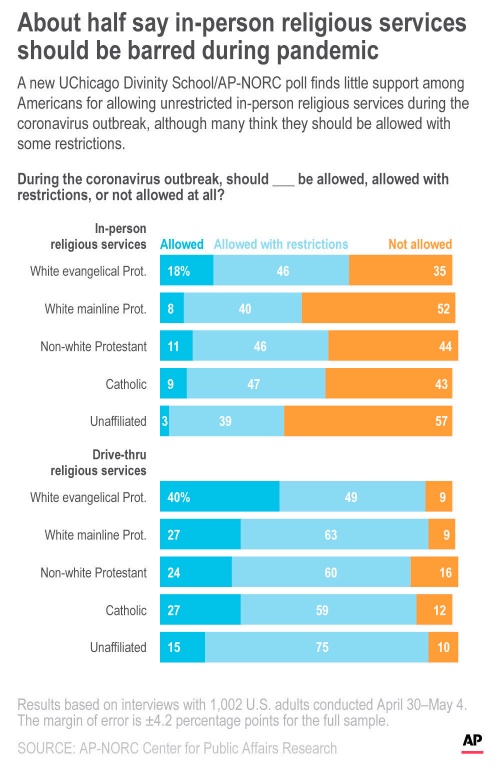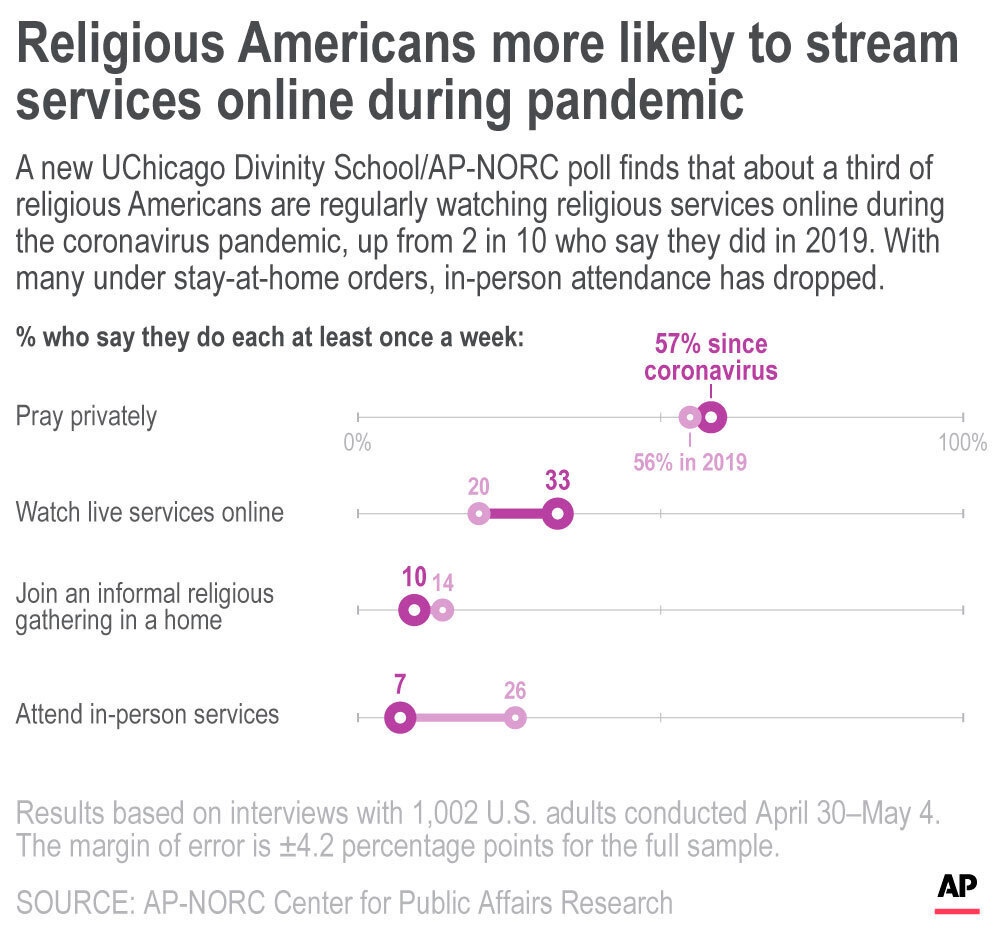Washington DC, US
AP
While the White House looks ahead to reopening houses of worship, most Americans think in-person religious services should be barred or allowed only with limits during the coronavirus pandemic – and only about a third say that prohibiting in-person services violates religious freedom, a new poll finds.
States have taken different approaches to resuming gatherings as the coronavirus continues to spread, raising tough questions for religious leaders and the faithful about the appropriate time to return. But the findings of the new poll by The University of Chicago Divinity School and The Associated Press-NORC Center for Public Affairs Research suggest that, even as President Donald Trump projects eagerness to reopen, many religious Americans are fine with waiting longer to return to their churches, synagogues and mosques.
Among that group is 54-year-old Andre Harris of Chicago, a onetime Sunday school teacher who has shifted his routine from physical worship to the conference calls his church is holding during the pandemic.
Harris, a Methodist, said that until “either there’s a vaccine, or if we know that things have calmed down, I am not comfortable going back to the actual building.”

A new UChicago Divinity School/AP-NORC poll finds little support among Americans for allowing unrestricted in-person religious services during the coronavirus outbreak, although many think they should be allowed with some restrictions.
Just nine per cent of Americans think in-person religious services should be permitted without restrictions, while 42 per cent think they should be allowed with restrictions, and 48 per cent think they should not be allowed at all, the poll shows. Even among Americans who identify with a religion, 45 per cent say in-person services shouldn’t be allowed at all.
White evangelical Protestants, however, are particularly likely to think that in-person services should be allowed in some form, with just 35 per cent saying they should be completely prohibited. Close to half – 46 per cent – also say they think prohibiting those services violates religious freedom.
That constituency’s support for some form of in-person worship underscores the political importance of Trump’s public calls to restore religious gatherings as a symbol of national recovery from the virus, as energising evangelical voters remains a key element of the President’s re-election strategy. Trump won praise from some evangelical leaders for citing the aspirational ideal of “packed churches” on Easter during the first weeks of the pandemic, though his goal didn’t materialise on Christianity’s holiest day.
Trump has since consulted with religious leaders on a phased-in return to in-person worship.
“It’s wonderful to watch people over a laptop, but it’s not like being at a church,” Trump said during a Fox News town hall on Sunday. “And we have to get our people back to churches, and we’re going to start doing it soon.”
Vice President Mike Pence met with faith leaders Friday in Iowa to talk about their reopening of worship, describing the constraints on worship assemblies as “a source of heartache” for the faithful.
Iowa is one of several states, including Tennessee and Montana, where restrictions on in-person services are starting to ease as stay-home orders imposed to stop the virus run their course.
That’s in line with the preference of Patrick Gideons, 63, of Alvin, Texas, who said worshippers “should be able to do what they want.”
“If they want to be able to hold church the way they normally do, they should be able to do that,” said Gideons, a self-described born-again Baptist.
As houses of worship wrestle with when to reopen, draft guidance by a team at the Centers for Disease Control and Prevention that offered recommendations for faith gatherings has been shelved by the Trump administration. While those guidelines aimed to help religious organisations use best practices to protect people from the virus, leaders in various denominations have already initiated their own discussions.
“Churches are very aware of the implications of people gathering in their buildings,” Kenneth Carter, president of the United Methodist Church’s Council of Bishops, said in a recent interview about the draft CDC guidance.
Compared with in-person religious services, Americans are more likely to favour allowing drive-through services, although most still say there should be limits. Overall, 25 per cent think that those services should be allowed without any limits, and 62 per cent say they should be allowed with limits.
The Justice Department last month sided with a Mississippi church in its legal challenge to local limits on drive-in worship. Still, the poll found 56 per cent of Americans say prohibiting drive-in services does not violate religious freedom.
White evangelical Protestants were more likely than those of other faiths to favour allowing drive-through services without restriction, at 40 per cent. In total, those who identify with a religious faith are more likely than those who do not to favour no restriction on drive-through religious services, 28 per cent to 15 per cent.

A new UChicago Divinity School/AP-NORC poll finds that about a third of religious Americans are regularly watching religious services online during the coronavirus pandemic, up from two in 10 who say they did in 2019. With many under stay-at-home orders, in-person attendance has dropped.
As many houses of worship have paused in-person services, a sizable share of religious Americans have used technology to connect with their faith. One-fifth of religious Americans said they watched livestreamed religious services online at least weekly in 2019 – but since the outbreak began, that has risen to 33 per cent.
About a third of evangelical Protestants streamed services at least weekly in 2019, but about half do now. Among Catholics, the share streaming services weekly has increased from 11 per cent to 22 per cent.
For members of the Southern Baptist Convention, when and how to resume in-person worship “would be a congregation-by-congregation decision,” Russell Moore, president of the Ethics & Religious Liberty Commission, said in a recent interview about the draft CDC guidance.
Moore predicted that some virtual worship would continue even as areas resume in-person gatherings. Part of his work in offering resources to inform decisions, Moore said, involves “preparing churches for the fact that reopening probably won’t be one Sunday when everything goes back to the status quo.”
“Instead, there’s going to be probably a lengthy period of time where multiple things are happening at once,” Moore said.






